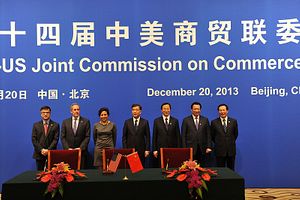The United States and China held the annual Joint Commission on Commerce and Trade (JCCT) in Beijing last week. The meeting, hosted by Chinese Vice Premier Wang Yang, was attended by U.S. Secretary of Commerce Penny Pritzker, Secretary of Agriculture Tom Vilsack, and Trade Representative Michael Froman.
When asked by the New York Times what the U.S. gained at the JCCT, Pritzker answered not with specific gains but with a vague statement about deeper relationships: “We made a lot of progress I think in relationship-building over the last 48 hours.” If the signature achievement of bilateral talks is “relationship-building,” it’s safe to say that there weren’t any significant breakthroughs.
The JCCT, like many high-level trade talks between the U.S. and China, could give observers a sense of déjà vu. Both countries discussed their major areas of dissatisfaction and received vague promises of improvement. But progress remains slow, as evidenced by the fact that many of these issues have been around for decades.
For example, Secretary Pritzker pointed to progress on intellectual property rights (IPR) in the talks. In an interview with the New York Times, Pritzker said that China has agreed to update what she called “antiquated laws that have not been addressed since their admission to the WTO.” For China, Xinhua reports that the U.S. has agreed to “encourage the civil high-tech U.S. exports to China.” Both of these issues (IPR and limits on high-tech exports) recur at every trade-focused meeting between the two countries.
Looking more closely, the progress made on these issues is predictably small. According to the U.S. Commerce Department’s fact sheet, the main promise China made on IPR was to have a national group “adopt and publish an Action Program on trade secrets protection and enforcement.” In other words, China has agreed to update its IPR laws and enforcement mechanisms, but there are no guarantees that the new plan will actually address U.S. concerns.
China seems to have gained even less ground on its signature issue, U.S. government-mandated restrictions on high-tech exports to China. In her interview with the New York Times, Pritzker’s main evidence of progress on this front was the Wassenaar Arrangement, an international agreement “promoting transparency and greater responsibility in transfers of conventional arms and dual-use goods and technologies.” China is not a participating state in the arrangement, but Pritzker said it was “significant” that “China was not excluded.” It’s a safe bet that China isn’t exactly overwhelmed by this step. U.S. promises to “encourage” high-tech exports also provide no commitment that Washington will actually begin rolling back the restrictions.
Perhaps the most important announcement at the JCCT was the news that China will submit a new bid to join the World Trade Organization’s Government Procurement Agreement (GPA). The bid is expected to come in 2014. The U.S. has been pressing China to open purchases by local governments and state-owned enterprises to foreign competition, and Beijing may now be willing to take that step. The U.S. Commerce Department expects China’s new bid to be “commensurate with the coverage of GPA parties,” meaning China will accede to the agreement without preserving large exceptions.
Government procurement, while a subset of larger trade concerns, symbolizes many of the larger issues at play. On one hand, what the U.S.-China Business Council calls discriminatory practices in government procurement represents the market access issues that foreign firms still face in China. From China’s point of view, however, giving domestic firms a leg-up in government purchases is an important tool for fostering indigenous innovation and for encouraging domestic growth in high-priority industries. If China does enter the GPA without preserving wide swatches of exempt industries, it will be a positive sign for broader issues of market access.
Unlike other recent trade talks, there was a sense of optimism for the future at the JCCT. Both sides are hopeful that the reforms as outlined by China’s recent Third Plenum will have positive effects on bilateral trade relations. Vice Premier Wang, as quoted by Xinhua, said that “the decision on reform approved by the third Plenary Session of the 18th Communist Party of China (CPC) Central Committee in November will offer strong impetus to bilateral trade.” Pritzker also expressed cautious optimism regarding the potential for reforms to help trade: “I’m encouraged that the Third Party Plenum seems very consistent with the direction that we’re going with the JCCT on a number of issues.” Still, she remarked that the U.S. would need to see how the talk “translates into real reform.”

































